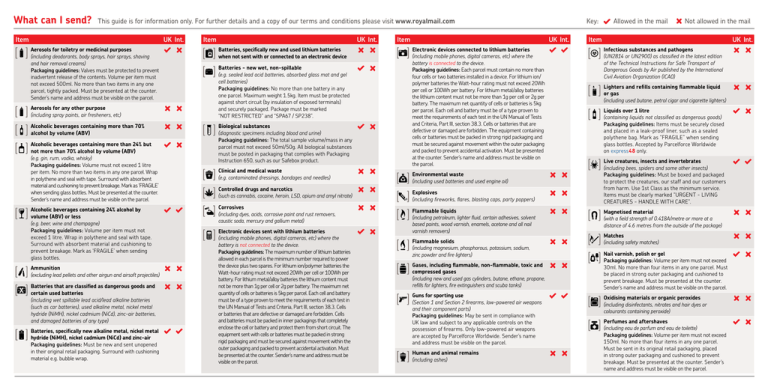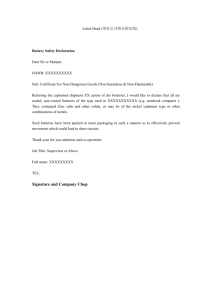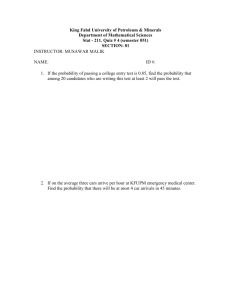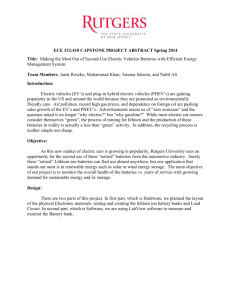
What can I send?
This guide is for information only. For further details and a copy of our terms and conditions please visit www.royalmail.com
Item
UK Int.
Aerosols for toiletry or medicinal purposes
(including deodorants, body sprays, hair sprays, shaving
and hair removal creams)
Packaging guidelines: Valves must be protected to prevent
inadvertent release of the contents. Volume per item must
not exceed 500ml. No more than two items in any one
parcel, tightly packed. Must be presented at the counter.
Sender’s name and address must be visible on the parcel.
Aerosols for any other purpose
(including spray paints, air fresheners, etc)
Alcoholic beverages containing more than 70%
alcohol by volume (ABV)
Alcoholic beverages containing more than 24% but
not more than 70% alcohol by volume (ABV)
(e.g. gin, rum, vodka, whisky)
Packaging guidelines: Volume must not exceed 1 litre
per item. No more than two items in any one parcel. Wrap
in polythene and seal with tape. Surround with absorbent
material and cushioning to prevent breakage. Mark as ‘FRAGILE’
when sending glass bottles. Must be presented at the counter.
Sender’s name and address must be visible on the parcel.
Alcoholic beverages containing 24% alcohol by
volume (ABV) or less
(e.g. beer, wine and champagne)
Packaging guidelines: Volume per item must not
exceed 1 litre. Wrap in polythene and seal with tape.
Surround with absorbent material and cushioning to
prevent breakage. Mark as ‘FRAGILE’ when sending
glass bottles.
Ammunition
(excluding lead pellets and other airgun and airsoft projectiles)
X
Batteries that are classified as dangerous goods and
certain used batteries
(including wet spillable lead acid/lead alkaline batteries
(such as car batteries), used alkaline metal, nickel metal
hydride (NiMH), nickel cadmium (NiCd), zinc-air batteries,
and damaged batteries of any type)
Batteries, specifically new alkaline metal, nickel metal
hydride (NiMH), nickel cadmium (NiCd) and zinc-air
Packaging guidelines: Must be new and sent unopened
in their original retail packaging. Surround with cushioning
material e.g. bubble wrap.
Item
UK Int.
Batteries, specifically new and used lithium batteries
when not sent with or connected to an electronic device
Batteries - new wet, non-spillable
(e.g. sealed lead acid batteries, absorbed glass mat and gel
cell batteries)
Packaging guidelines: No more than one battery in any
one parcel. Maximum weight 1.5kg. Item must be protected
against short circuit (by insulation of exposed terminals)
and securely packaged. Package must be marked
“NOT RESTRICTED” and “SPA67 / SP238”.
Biological substances
(diagnostic specimens including blood and urine)
Packaging guidelines: The total sample volume/mass in any
parcel must not exceed 50ml/50g. All biological substances
must be posted in packaging that complies with Packaging
Instruction 650, such as our Safebox product.
Clinical and medical waste
(e.g. contaminated dressings, bandages and needles)
Controlled drugs and narcotics
(such as cannabis, cocaine, heroin, LSD, opium and amyl nitrate)
Corrosives
(including dyes, acids, corrosive paint and rust removers,
caustic soda, mercury and gallium metal)
Electronic devices sent with lithium batteries
(including mobile phones, digital cameras, etc) where the
battery is not connected to the device.
Packaging guidelines: The maximum number of lithium batteries
allowed in each parcel is the minimum number required to power
the device plus two spares. For lithium ion/polymer batteries the
Watt-hour rating must not exceed 20Wh per cell or 100Wh per
battery. For lithium metal/alloy batteries the lithium content must
not be more than 1g per cell or 2g per battery. The maximum net
quantity of cells or batteries is 5kg per parcel. Each cell and battery
must be of a type proven to meet the requirements of each test in
the UN Manual of Tests and Criteria, Part III, section 38.3. Cells
or batteries that are defective or damaged are forbidden. Cells
and batteries must be packed in inner packagings that completely
enclose the cell or battery and protect them from short circuit. The
equipment sent with cells or batteries must be packed in strong
rigid packaging and must be secured against movement within the
outer packaging and packed to prevent accidental activation. Must
be presented at the counter. Sender’s name and address must be
visible on the parcel.
Item
Key:
UK Int.
Electronic devices connected to lithium batteries
(including mobile phones, digital cameras, etc) where the
battery is connected to the device.
Packaging guidelines: Each parcel must contain no more than
four cells or two batteries installed in a device. For lithium ion/
polymer batteries the Watt-hour rating must not exceed 20Wh
per cell or 100Wh per battery. For lithium metal/alloy batteries
the lithium content must not be more than 1g per cell or 2g per
battery. The maximum net quantity of cells or batteries is 5kg
per parcel. Each cell and battery must be of a type proven to
meet the requirements of each test in the UN Manual of Tests
and Criteria, Part III, section 38.3. Cells or batteries that are
defective or damaged are forbidden. The equipment containing
cells or batteries must be packed in strong rigid packaging and
must be secured against movement within the outer packaging
and packed to prevent accidental activation. Must be presented
at the counter. Sender’s name and address must be visible on
the parcel.
Environmental waste
(including used batteries and used engine oil)
Explosives
(including fireworks, flares, blasting caps, party poppers)
Flammable liquids
(including petroleum, lighter fluid, certain adhesives, solvent
based paints, wood varnish, enamels, acetone and all nail
varnish removers)
Flammable solids
(including magnesium, phosphorous, potassium, sodium,
zinc powder and fire lighters)
Gases, including flammable, non-flammable, toxic and
compressed gases
(including new and used gas cylinders, butane, ethane, propane,
refills for lighters, fire extinguishers and scuba tanks)
Guns for sporting use
(Section 1 and Section 2 firearms, low-powered air weapons
and their component parts)
Packaging guidelines: May be sent in compliance with
UK law and subject to any applicable controls on the
possession of firearms. Only low-powered air weapons
are accepted by Parcelforce Worldwide. Sender’s name
and address must be visible on the parcel.
Human and animal remains
(including ashes)
Allowed in the mail
Not allowed in the mail
Item
UK Int.
Infectious substances and pathogens
(UN2814 or UN2900) as classified in the latest edition
of the Technical Instructions for Safe Transport of
Dangerous Goods by Air published by the International
Civil Aviation Organization (ICAO)
Lighters and refills containing flammable liquid
or gas
(including used butane, petrol cigar and cigarette lighters)
Liquids over 1 litre
(containing liquids not classified as dangerous goods)
Packaging guidelines: Items must be securely closed
and placed in a leak-proof liner, such as a sealed
polythene bag. Mark as “FRAGILE” when sending
glass bottles. Accepted by Parcelforce Worldwide
on express48 only.
Live creatures, insects and invertebrates
(including bees, spiders and some other insects)
Packaging guidelines: Must be boxed and packaged
to protect the creatures, our staff and our customers
from harm. Use 1st Class as the minimum service.
Items must be clearly marked “URGENT - LIVING
CREATURES - HANDLE WITH CARE”.
Magnetised material
(with a field strength of 0.418A/metre or more at a
distance of 4.6 metres from the outside of the package)
Matches
(including safety matches)
Nail varnish, polish or gel
Packaging guidelines: Volume per item must not exceed
30ml. No more than four items in any one parcel. Must
be placed in strong outer packaging and cushioned to
prevent breakage. Must be presented at the counter.
Sender’s name and address must be visible on the parcel.
Oxidising materials or organic peroxides
(including disinfectants, nitrates and hair dyes or
colourants containing peroxide)
Perfumes and aftershaves
(including eau de parfum and eau de toilette)
Packaging guidelines: Volume per item must not exceed
150ml. No more than four items in any one parcel.
Must be sent in its original retail packaging, placed
in strong outer packaging and cushioned to prevent
breakage. Must be presented at the counter. Sender’s
name and address must be visible on the parcel.
What can I send?
Item
UK Int.
Perishables
(including flowers, fresh fruit, vegetables and frozen or
chilled foodstuffs. Frozen water and dry ice are prohibited)
Packaging guidelines: Use 1st Class as the minimum
service. Should be able to withstand a journey of
up to 48 hours. Must be suitably sealed to prevent
leakage or tainting of other items. Packages must be
clearly labelled “PERISHABLE”.
Pesticides
(e.g. weed killer and any chemical used to kill pests and
insects including fly sprays)
Poisons, toxic liquids, solids and gases
(including substances that are liable to cause death
or injury if swallowed or inhaled or by skin contact,
including arsenic, cyanide, fluorine, rat poison)
Prescription medicines and drugs sent for
scientific or medical purposes
(toxic, flammable or toxic and flammable)
Prescription medicines and drugs sent for
scientific or medical purposes
(non-toxic and non-flammable including asthma inhalers)
Packaging guidelines: Medicines must be securely
closed and placed in a sealed polythene bag (for
liquids) or a siftproof container (for solids). Must
be tightly packed in strong outer packaging and
cushioned to prevent breakage. Sender’s name
and address must be visible on the parcel.
Radioactive materials and samples
(Classified as dangerous goods such as luminous dials
from aircraft)
Are you
posting safely?
To comply with national and international
regulations governing the carriage of mail,
and ensure that mail in transport does not
present a danger to the general public,
we restrict or prohibit certain items
from our network.
We want to ensure the mail is safe for everyone.
Many everyday items, such as aerosols, nail varnish
and perfumes are considered dangerous goods under
transport legislation.
Royal Mail can arrange for alternative formats
of this booklet to be sent to you in:
• Large print
• Braille
• Audio CD
• Audio Cassette
To obtain a free copy call Customer Services on
08457 740 740
Textphone service for customers who are deaf
or hearing impaired: 08456 000 606
Alternatively, please visit
www.royalmail.com/prohibitedgoods or
www.parcelforce.com/retailprohibitions
ailure to comply with these controls
F
could result in prosecution.
You are responsible for checking whether or not
an item is prohibited or restricted.
Consumer warning markings
Products bearing the following consumer warning
symbols ARE dangerous goods and are prohibited
unless specifically permitted overleaf.
Solvent-based paints, wood varnishes
and enamels
Although correct on the date this leaflet went to print (May 2013),
prohibitions and restrictions along with other terms and conditions are
subject to revision from time to time. We reserve the right to refuse any
other item banned by law or that in our opinion may be harmful or dangerous
to our customers or employees. Up-to-date information may be obtained
by contacting Royal Mail Customer Services on 08457 740 740
or by visiting www.royalmail.com/prohibitedgoods
Royal Mail, the Cruciform and the colour red are registered trade marks of
Royal Mail Group Ltd. Parcelforce Worldwide, Parcelforce and the Parcelforce
Worldwide globe logo are registered trade marks of Royal Mail Group Ltd.
© Royal Mail Group Ltd 2013. All rights reserved. Royal Mail Group Ltd
registered in England and Wales, number 4138203, registered office
100 Victoria Embankment, London EC4Y 0HQ.
Waste, dirt, filth or refuse
(including household waste)
Weapons
(including Section 5 firearms, CS gas and pepper sprays,
flick knives, tasers and stun guns)
If you send prohibited goods or restricted goods (and you do not comply
with the relevant terms and conditions), we may deal with the goods as
we see fit, including but not limited to, disposing of the parcels concerned
(in whole or in part).
To help you...
Note: A product bearing only the corrosive marking (depicted bottom right
above) is NOT classified as dangerous goods if the signal word and hazard
statement ‘Danger - causes serious eye damage’ applies.
RMDG1A
Prohibited and
restricted items
A guide to what you can and
cannot send in the mail
Valid from 15th July 2013



